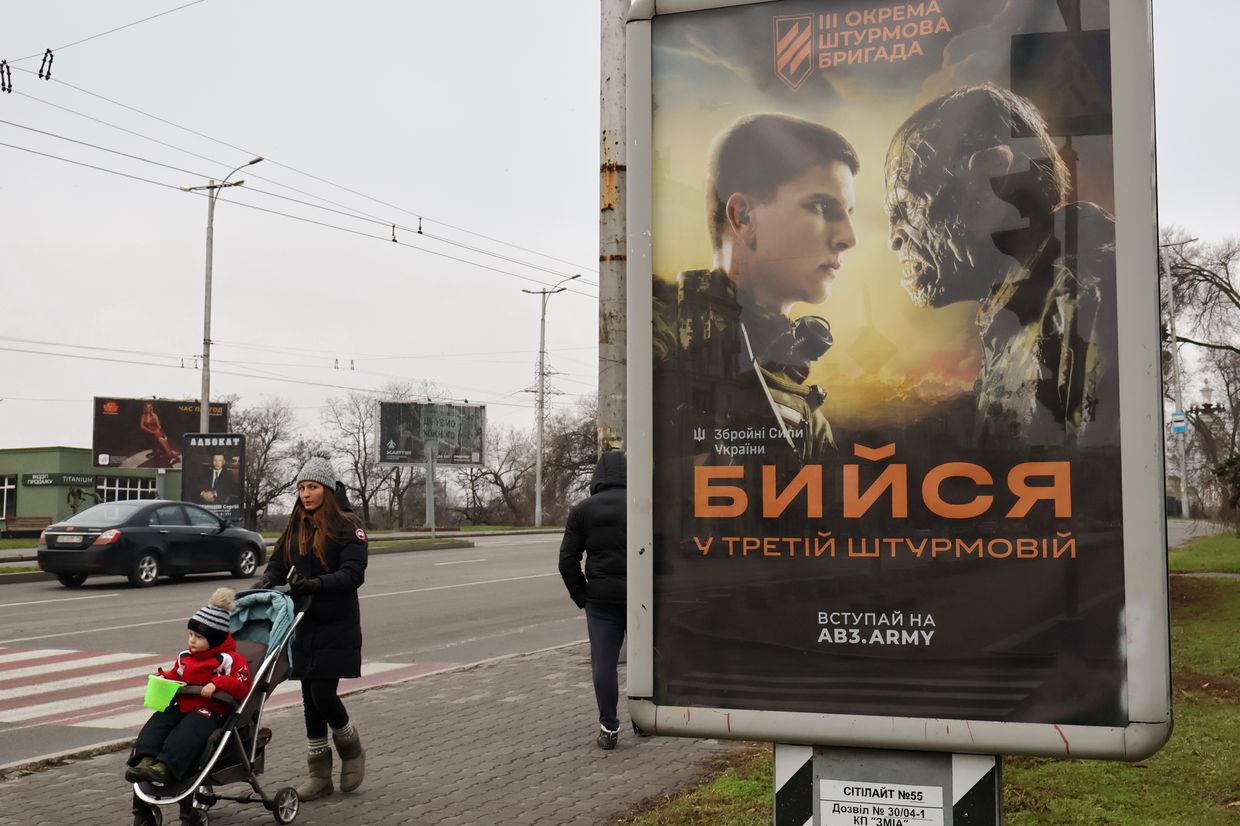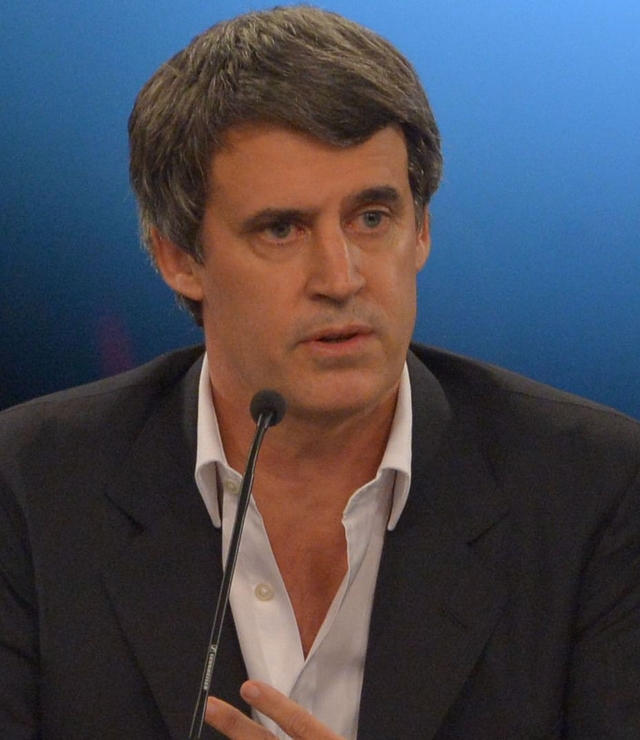Opinion: The Kursk incursion underlines the urgency of unrestricted support for Ukraine
Restricting Kyiv's military actions, including the Kursk incursion, only serves to prolong the war and bolster Russia; full support for Ukraine's approach is crucial for advancing peace.

Ukrainian servicemen operate an armored military vehicle on a road near the border with Russia, in Sumy Oblast, Ukraine, on Aug. 14, 2024. (Roman Pilipey /AFP via Getty Images)

Alfonso Prat-Gay
Now is not the time to micro-manage Kyiv’s actions or to withhold supplies and impose strict caveats on equipment use, especially against military targets in Russian territory, out of fear of escalating the war, possibly to a nuclear level.
Over the past few years, Ukrainians have learned that externally-imposed restrictions, aimed at keeping the war contained within Ukraine’s borders, have only enabled Russia and, tragically, led Ukraine into a lethal war of attrition. It’s too early to judge if Kyiv’s recent military incursion into Kursk Oblast, launched in early August, was the right approach, though it has succeeded in boosting the morale of Ukrainian troops and civilians, especially after the failure of the 2023 counteroffensive against entrenched Russian defenses.
Ukrainians and their allies have been concerned that the sheer scale of Russian numbers could eventually give Russia the upper hand against the determined but numerically disadvantaged Ukrainians. Despite Russia having already suffered 600,000 casualties, with 15-20% of these being fatalities, its population is at least four times larger than Ukraine's, and its economy is 15 times the size. This disparity is evident in Russia's mobilization numbers and its defense industry’s capacity to expand.
The Ukrainian intervention in Kursk has several objectives, according to Oleksandr Merezhko, the chair of Kyiv’s parliamentary foreign affairs committee. These include relieving pressure on other fronts and providing a buffer zone for Ukrainian forces around the eastern Ukrainian city of Sumy.
Strategically, it also demonstrates, he says, "that we can turn the tide and show results to Western taxpayers." He hopes the Kursk operation will have a similar impact to the Wagner mutiny, which saw Yevgeny Prigozhin, founder of the Wagner Group, drive from Rostov-on-Don to Moscow in June 2023. This event, which ended in negotiations with a surprised Kremlin, highlighted the vulnerabilities and weaknesses within the Russian state.
The Kursk advance creates an opportunity for diplomatic leverage. Until now, the political efforts for peace have lagged behind the military developments.
Ukraine’s move into Russia should be viewed in the context of Ukrainian President Volodymyr Zelensky’s 10-point peace plan. For peace to take hold, Ukraine must show that there are greater benefits to peace than to continuing the war, and demonstrate a viable path to achieving it. Additionally, external powers must actively encourage both sides to come to the negotiating table.
Enormous challenges remain, particularly among states that prioritize narrow interests over human rights. Some key African and Latin American countries fall into this category, such as Colombia and South Africa. While South Africa has pressured Israel over Gaza through international courts, it has not done the same with Russia, its BRICS ally, regarding the full-scale war against Ukraine.
Egypt and Ethiopia are similarly among the fence-sitters, indicating as much about their preference for Russian President Vladimir Putin’s style of governance as their interests in arms transfers and geopolitical allegiances. Brazil and China, with their own peace formula, essentially offer a rival process to Ukraine’s, potentially with tacic Russian support as fellow BRICS members.
Rival processes often expect Ukraine to make concessions that China, Brazil, or other BRICS members would be unwilling to make. Most Ukrainians are committed to one key negotiating principle: the return of all territory according to the 1991 borders, including Crimea. That Ukraine is striving for its sovereignty should be important to African states in particular, given the continental propensity for weak borders that criss-cross ethnic allegiances and communities.
Neutrality in this conflict often equates to working in Russia’s favor. A Russian victory would suggest, as former Ukrainian Prime Minister Yulia Tymoshenko put it, that "Dictators International" would be the norm. This has broader implications for democrats everywhere, from Venezuela to Zimbabwe, where civilians struggle against authoritarianism.
Goals also matter. Ukraine’s demands are not just about territory; as Nobel laureate Oleksandra Matviichuk points out, they represent "a historic opportunity to change the approach to justice for war crimes." War tends to deepen poverty, and in Kharkiv, the daily reality of war is evident in the ruined buildings and the constant threat of air raids.
The cost of turning a blind eye to Russia’s wanton destruction in eastern and southern Ukraine extends beyond the loss of civilian lives and infrastructure. It reflects a situation where the state's interests overshadow those of the individual, contrary to the human rights principles established after World War II.
Ukraine will need safeguards, such as potential membership in the European Union and NATO (with interim NATO-like security guarantees). The goal is to achieve EU membership by 2029, ahead of the next European parliamentary elections, according to Maria Mezentseva, a Ukrainian MP from Kharkiv working on Euro-Atlantic integration. While NATO membership could be challenging while at war, Ukraine's interoperability with NATO demonstrates progress.
The Russian invasion has accelerated Ukraine’s integration with the West. This has been facilitated not only by accession talks but also by the movement of people, with over five million Ukrainian refugees in Europe, and the strengthening of logistics chains with the West. Ukraine’s leadership in defense technology innovation also reflects this shift. While there is still much to be done, especially in governance, the benefits of this integration are evident: Ukraine’s per capita wealth is just $2,200, compared to the Eurozone average of $37,400.
Ukraine’s progress post-war will depend on the continued flow of financial support, which will rely on its role as a bulwark against Russia and its ability to improve governance and combat corruption. For now, the priority remains maintaining the flow of money and arms from the West while pursuing peace – an ongoing balancing act skillfully managed by Zelensky.
Ukraine demonstrates the crucial role of technology in modern warfare. Without the internet and advancements in drone technology, soldiers would operate almost blindly. Yet, the fundamentals of war—logistics, training, mass, maneuver, and fighting spirit—remain constant. Khartiia’s officer praised his troops’ proficiency with the Browning ‘5-oh,’ considered a ‘strategic weapon’ by the Russians, but noted a shortage of artillery ammunition, particularly of NATO standards.
Ukraine can still do more, especially in mobilizing troops, despite advances through apps like Reserve-Plus and Army-Plus. Only infantry can hold ground effectively at this stage, as drones are not yet a substitute. Kyiv feels oddly normal compared to a wartime city, contrasting with the image of London in 1942. Effective debt management and financial sacrifices are necessary, echoing Churchill’s reminder that sometimes “you must do what is required.”
Ukraine should be cautious not to take outside assistance for granted, as the recent experience in Afghanistan highlights the unpredictability of international support and the severe consequences of misplaced trust.
In the midst of the Kursk incursion, excluding the possibilities of Putin’s departure or a Russian economic collapse, four potential peace scenarios emerge.
The first would involve Ukraine expelling Russia, either through military action or negotiations. This would require the timely delivery of promised Western weapons and the deployment of well-trained, refreshed Ukrainian brigades.
A second scenario is that Kyiv might negotiate from a position of weakness.
A third possibility is meeting Putin’s demands, which would entail Ukraine forgoing NATO (or EU) membership for security guarantees. This assumes Putin would abandon what former Ukrainian President Viktor Yushchenko describes as an “imperial project to recreate the Russian empire,” an ambition he argues is impossible without Ukraine.
The fourth, more speculative scenario is that an outsider – such as former U.S. President Donald Trump or even Chinese President Xi Jinping – might threaten both Russia and Ukraine with increased escalation or reduced support in order to broker a deal.
These scenarios hinge on the level of support among Ukrainians for negotiations. Support for Zelensky has dropped from over 90% at the start of 2023 to 54% in June (before the Kursk invasion). Fewer Ukrainians are willing to negotiate if it involves conceding territory acquired after 1991. Support for negotiating to end the war fell from 43% to 26% when respondents were asked to choose between negotiating with Russia and continuing the fight. Ultimately, peace will be a political decision.
The Kursk incursion seeks to counter Russia's overwhelming economic and numerical strength through surprise, maneuver, and Ukrainian tactical ingenuity. “It appeared that Ukraine was going to fall,” admits Oleksandr Lytvynenko, Secretary of Ukraine’s National Defense and Security Council, describing Russia's advance as “one hundred to two hundred meters per day, very slow, but seemingly unstoppable.”
Turning the tactical gains from Kursk into strategic success depends on several factors, including the scale, speed, and type of international assistance. Zelensky stressed on August 17, 11 days into the operation, that “it is undoubtedly important for us that our partners remove the barriers that prevent us from weakening Russian positions as required by the course of the war.” Long-range capabilities are key to resolving the most critical issues, but there’s also the need to build diplomatic support, maintain economic stability, and strengthen the armed forces to withstand Russia’s military.
While the operation is risky, Kursk has already shifted the war’s narrative. Whether this shift will be enough to sustain international support—particularly with the US election in November 2024 looming—depends on Kyiv’s ability to hold its ground as leverage in future negotiations. Support for Ukraine or Russia ultimately ties into the broader issue of defending or opposing the international rules-based order, especially the principle of non-interference in states' internal affairs. Russia and its allies want to deepen this principle domestically while maintaining the right to interfere externally.
With Kursk, the stakes have risen, and they could climb even higher if Ukraine launches further surprise actions, such as in Crimea or elsewhere. Lytvynenko points out that Russia’s strategy rests on rejecting Ukrainian identity. “But,” he smiles, “we don’t think this way because, axiomatically, we are not Russian.” However, he warns against Ukraine engaging in a drawn-out war of attrition, given Russia's numerical advantage. Instead, Kyiv must focus on an asymmetric strategy – fighting smart. “We have no territorial claims against Russia,” Lytvynenko adds. “We don’t want to intervene in Russia or change its government. We just want to determine our own future.”
Ukraine’s ability to determine its future depends on battlefield success. Given the broader implications for international law, human rights, and justice, Ukrainians deserve not just to see Putin defeated – they deserve victory.
Editor’s Note: The opinions expressed in the op-ed section are those of the authors and do not purport to reflect the views of the Kyiv Independent.















